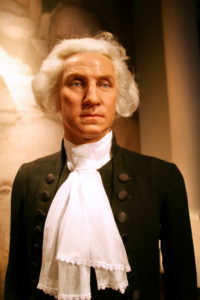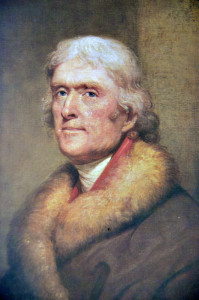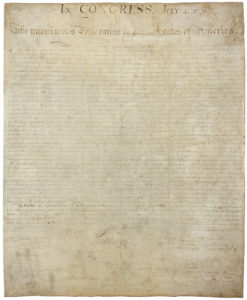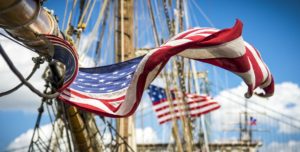Posted by Roberta Grimes • July 04, 2020 • 12 Comments
Book News, The American Revolution, Thomas Jefferson
Oh beautiful, for heroes proved in liberating strife,
Who more than self their country loved, and mercy more than life!
America! America! May God thy gold refine,
‘Till all success be nobleness and every gain divine.
– Katharine Lee Bates (1859-1929) from “America the Beautiful” (1895)
 The purpose of human life is spiritual growth, and achieving it requires that our minds be free. Today we celebrate the fact that 244 years ago a few aristocrats conceived the notion of building their government around a fundamental need to protect the liberties of all the people being governed. Thanks to their vision, there is at least one place in this sadly un-free world where individual liberty has been tried and proven, and where it now can take its stand.
The purpose of human life is spiritual growth, and achieving it requires that our minds be free. Today we celebrate the fact that 244 years ago a few aristocrats conceived the notion of building their government around a fundamental need to protect the liberties of all the people being governed. Thanks to their vision, there is at least one place in this sadly un-free world where individual liberty has been tried and proven, and where it now can take its stand.
We cannot imagine how radical the American experiment was in 1787. The Constitution of the United States provides for a government that guarantees expanded rights and liberties; and our Declaration of Independence includes the greatest statement of human equality and worth ever written. This is the only nation on earth whose continuous democratic form of government is more than 200 years old, and its stability is due in considerable part to the fact that it is not a straight democracy. This country is instead a republic, so it protects its weaker citizens from the whims of the majority. As a result of its expanded rights and liberties and its unprecedented governmental stability, the United States of America has been in every year since 1871 the most prosperous nation on earth. We have work to do to correct the mess that America’s race relations have been; but even despite their past limitations, African Americans today are among the freest and richest people on earth.
In researching My Thomas, I came to love the architects of this experiment in liberty. For the first time in history, powerful leaders voluntarily gave up their power and willingly submitted themselves to government by the masses! Here are our first five presidents and a beloved elder statesman as they where thinking through the great American experiment.
* George Washington (1732-1799)
Our cause is noble; it is the cause of mankind!
– Letter to James Warren, March 31, 1779
 A people… who are possessed of the spirit of commerce, who see and who will pursue their advantages may achieve almost anything.
A people… who are possessed of the spirit of commerce, who see and who will pursue their advantages may achieve almost anything.
– Letter to Benjamin Harrison, October 10, 1784
I had always hoped that this land might become a safe and agreeable asylum to the virtuous and persecuted part of mankind, to whatever nation they might belong. – Letter to Francis Van der Kamp, May 28, 1788
May the Children of the Stock of Abraham, who dwell in this land, continue to merit and enjoy the good will of the other Inhabitants; while every one shall sit in safety under his own vine and figtree, and there shall be none to make him afraid. – Letter to the Hebrew Congregation of Newport, Rhode Island, August 18, 1790
It will be worthy of a free, enlightened, and, at no distant period, a great Nation, to give to mankind the magnanimous and too novel example of a People always guided by an exalted justice and benevolence.
– Farewell Address, September 19, 1796
* John Adams (1735-1826)
Liberty must at all hazards be supported. We have a right to it, derived from our Maker. But if we had not, our fathers have earned and bought it for us, at the expense of their ease, their estates, their pleasure, and their blood. – A Dissertation on the Canon and Feudal Law, 1765
Fear is the foundation of most governments; but it is so sordid and brutal a passion, and renders men in whose breasts it predominates so stupid and miserable, that Americans will not be likely to approve of any political institution which is founded on it. – Thoughts on Government, 1776
I must study politics and war that my sons may have liberty to study mathematics and philosophy. My sons ought to study mathematics and philosophy, geography, natural history and naval architecture, navigation, commerce and agriculture, in order to give their children a right to study painting, poetry, music, architecture, statuary, tapestry, and porcelain.
– Letter to Abigail Adams, 1780
 * Thomas Jefferson (1743-1826)
* Thomas Jefferson (1743-1826)
The God who gave us life, gave us liberty at the same time; the hand of force may destroy, but cannot disjoin them. – Summary View of the Rights of British America, 1774
My god! How little do my countrymen know what precious blessings they are in possession of, and which no other people on earth enjoy!
– Letter to James Monroe, June 17, 1785
I like a little rebellion now and then. It is like a storm in the atmosphere. – Letter to Abigail Adams, February 22, 1787
What country can preserve its liberties if their rulers are not warned from time to time that their people preserve the spirit of resistance. Let them take arms. – Letter to James Madison, December 20, 1787
The republican is the only form of government which is not eternally at open or secret war with the rights of mankind. – Letter to William Hunter, March 11, 1790
I would rather be exposed to the inconveniencies attending too much liberty than those attending too small a degree of it. – Letter to Archibald Stewart, Dec 23, 1791
[A] wise and frugal government… shall restrain men from injuring one another, shall leave them otherwise free to regulate their own pursuits of industry and improvement, and shall not take from the mouth of labor the bread it has earned. This is the sum of good government.
– First Inaugural Address, March 4, 1801
 Sometimes it is said that man can not be trusted with government of himself. Can he, then, be trusted with the government of others? Or have we found angels in the forms of kings to govern him?
Sometimes it is said that man can not be trusted with government of himself. Can he, then, be trusted with the government of others? Or have we found angels in the forms of kings to govern him?
– First Inaugural Address, March 4, 1801
The greatest good we can do our country is to heal its party divisions and make them one people. – Letter to John Dickinson, July 23, 1801
The freedom and happiness of man…[are] the sole objects of all legitimate government. – Letter to Thaddeus Kosciusko, 1810
I think we have more machinery of government than is necessary, too many parasites living on the labor of the industrious. – Letter to William Ludlow, September 6, 1824
Nothing then is unchangeable but the inherent and unalienable rights of man. – Letter to John Cartwright, 1824
* James Madison (1751-1836)
All men having power ought to be distrusted to a certain degree.
– Speech at the Constitutional Convention, July 11, 1787
Democracy is the most vile form of government. … democracies have ever been spectacles of turbulence and contention; have ever been found incompatible with personal security or the rights of property: and have in general been as short in their lives as they have been violent in their deaths. – The Federalist, No. 10, November 23, 1787
 The powers delegated by the proposed Constitution to the federal government are few and defined. Those which are to remain in the State governments are numerous and indefinite.
The powers delegated by the proposed Constitution to the federal government are few and defined. Those which are to remain in the State governments are numerous and indefinite.
– The Federalist No. 45, January 26, 1788
(The Constitution preserves) the advantage of being armed, which Americans possess over the people of almost every other nation… (where) the governments are afraid to trust the people with arms.
– The Federalist, No. 46, January 29, 1788
An ELECTIVE DESPOTISM was not the government we fought for; but one which should not only be founded on free principles, but in which the powers of government should be so divided and balanced among several bodies of magistracy, as that no one could transcend their legal limits, without being effectually checked and restrained by the others.
– The Federalist No. 48, February 1, 1788
There are more instances of the abridgment of the freedom of the people by gradual and silent encroachments of those in power than by violent and sudden usurpations. – Speech in the Virginia Ratifying Convention, June 16, 1788
It has been said that all Government is an evil. It would be more proper to say that the necessity of any Government is a misfortune. This necessity however exists; and the problem to be solved is, not what form of Government is perfect, but which of the forms is least imperfect.
– To an unidentified correspondent, 1833
* James Monroe (1758-1831)
 Our country may be likened to a new house. We lack many things, but we possess the most precious of all – liberty! – To his daughter, Eliza, and her Head of School in Paris, 1794
Our country may be likened to a new house. We lack many things, but we possess the most precious of all – liberty! – To his daughter, Eliza, and her Head of School in Paris, 1794
If we look to the history of other nations, ancient or modern, we find no example of a growth so rapid, so gigantic, of a people so prosperous and happy. – First Inaugural Address, March 4, 1817
* Benjamin Franklin (1706-1790) was the godfather of this experiment in liberty. And at the last, his great popularity in France brought that nation to intervene on America’s side just as our Revolution was about to be lost.
Our new Constitution is now established, everything seems to promise it will be durable; but, in this world, nothing is certain except death and taxes.
– Letter to French scientist Jean-Baptiste Le Roy on November 13, 1789
They who can give up essential liberty to obtain a little temporary safety deserve neither liberty nor safety.
– Memoirs of the life & writings of Benjamin Franklin, 1818
A republic, madam, if you can keep it.
– Answering a woman who asked him as he left the Constitutional Convention what sort of government the Founders had framed.
This great experiment in personal liberty is a quarter of a millennium old. We have abused it over the years, but thanks to the wisdom of that generation  of giants its structure and protections remain in place. We have only to polish it and tune it up, and its proven economic and spiritual promise can at last become this nation’s gift to all the people of the world.
of giants its structure and protections remain in place. We have only to polish it and tune it up, and its proven economic and spiritual promise can at last become this nation’s gift to all the people of the world.
Oh beautiful, for patriot dream that sees beyond the years
Thine alabaster cities gleam, undimmed by human tears!
America! America! God shed his grace on thee,
And crown thy good with brotherhood from sea to shining sea.
– Katharine Lee Bates (1859-1929) from “America the Beautiful” (1895)
Dearest Roberta,
This blog is an utter tour de force that should be required reading for all of us and especially our Policy Makers. I’d like to focus on one of your selections, “A Dissertation on the Canon and Feudal Law,” by John Adams, written in response to the Stamp Act which was essentially a tax on all publications and legal documents. One particular paragraph leapt out at me especially in the light of your previous blog. Consider first that Adams wrote this in 1765:
“Let the pulpit resound with the doctrines and sentiments of religious liberty. Let us hear the danger of thralldom to our consciences from ignorance, extreme poverty, and dependence, in short, from civil and political slavery. Let us see delineated before us the true map of man. Let us hear the dignity of his nature, and the noble rank he holds among the works of God, — that consenting to slavery is a sacrilegious breach of trust, as offensive in the sight of God as it is derogatory from our own honor or interest or happiness, — and that God Almighty has promulgated from heaven, liberty, peace, and good-will to man!”
Enough said. Thank you, Roberta, for bring this marvellous collection to our attention.
Yours,
Cookie
Oh dear Cookie, thank you for adding to that too-brief quotation from John Adams! I began this post a week ago, and it was three or four times the length that it is now; rather than adding anything, I spent the whole week cutting and pruning. Favoring short and pithy, and trying to let one Founding Father or another speak on each specific principle rather than leaving in similar quotations from more than one. During that curating process I noted that, for example, they all were adamantly in favor of having everyone be armed, and they saw that need especially in terms of their need to keep their government subservient. That’s not an idea that is popular now, but it certainly was popular then! And they all mistrusted democracies as inherently unstable and altogether destructive of individual rights. They were all adamantly against slavery, too, and I tried to leave in “Jefferson’s philippic against the slave trade” (Adams’s words) from the first draft of the Declaration, but it was just too long.
What is astonishing when you read these six leaders is how much they agree on everything! And how much they love not just their own rights and liberties, but especially the rights and liberties of the least among them in their respective colonies. How completely free they all seem to have been from racial animus, and that was true of even the Virginians. Four of our first five presidents owned slaves, but they all hated slavery and would have abolished it if they could have figured out a way to do that safely and without endangering the stability of their infant nation. The term “generation of giants” really is insufficient to express the sheer human quality, the gigantic intellects, of these wondrous six leaders!
Dearest Roberta,
Gotta say that these founding fathers are beyond impressive and they are known to be wise and true all over the world. It is most happy providence that brought such deep thinking visionaries together, to give rise to the great Republic that remains unique on Earth, being far ahead of anything in its time of inception.
I agree that democracies are able to be degraded, twisted, to neglect equal treatment of minorities, which may lead to persecution. Constitutional protection far too often falls short.
Many people in Australia for instance, feel that we need a bill of rights, as the US has, to strongly safeguard the protection of individuals. I too, support this view. No government however has actually moved to put one in place, though they have been petitioned to do so by many libertarian groups over the years. In this important area, we are lacking the vital protection of those who are vulnerable. We don’t have what the USA has.
And you are fortunate my dear, to have such principled founders to hold to, remembering the original values of your unique Republic. You know, I believe in holding true to core values. We can make changes to address the pressing needs and challenges of the times, and if these changes hold true to the principles that founded and defined the nation, we remain who we are. We can be the best we can be and we don’t lose our way. (Of course the original values have to be ethical and have liberty at heart.)
In short, I thank you for this week’s focus on the founders of the American Republic. Their words resonate far beyond American shores. These elevated souls have inspired multitudes around the world, and have been together a beacon of liberty for two and a half centuries.
And their values never die; they stand the test of time. Being untarnishable they are ever ready to be dusted off and raised high by any and all Americans, should they chose to do so. 🙏🏼❣️🦅
Dear Efrem, you are so lovely to talk about our founding generation this way, from far-away Australia! I admire the free spirit of your country, too, and its wisdom in kind of staying out of the way in the southern hemisphere, where a lot less seems to go wrong ;-).
I knew when I did this post that it was sufficiently off our beaten path here that it might not get much discussion. But with this country and its Founders quite literally under attack this summer, it seemed important to remind people of who these people actually were! When I was deep in researching My Thomas, I read a lot of what the leaders wrote, including everything Thomas Jefferson wrote before he turned forty. Which was a lot! I knew he was bright and well-educated, but what daily amazed me was seeing over and over again how deeply good he was. They all were. Noble, high-minded, even selfless. We simply don’t make people like that anymore :-(.
Effrem,
I echo Roberta’s response. Thank you for your words. The recent events in America have torn at my heart strings because I so sympathize with the oppressed. Yet I adore our founding fathers and believe they were genius for the work they accomplished and were most moral and true for their time. I am finding that I possess many traits of an empath, and what I used to think was weakness may actually be my strength. Thank you again.
Dear Timothy, I love your pointing out that for you to be an empath is actually a strength. There is in fact no greater strength! For those unclear about what an empath is, he is someone who is able to empathize with others to an extreme degree, even able to inhabit and share the deepest feelings of another person’s mind and heart. Because empaths readily take on the suffering of others, it is not surprising that you might see that tendency as a weakness or an inconvenience; but it is really only those who can so deeply empathize with everyone who have the power to really help others as we all learn to love even those who are less lovable. It is a remarkable gift!
Timothy, I’ve always looked at your Founding Fathers as a very special cluster of high minded, deeply ethical and visionary souls that only occurs very very rarely in history.
I link them, in my mind, to those souls that occurred in Athens post 500BC. Say, in the area of philosophy; the Pre Socratics who culminated in Plato and his account of Socrates. Here we have a set of souls who contemplated the inner nature of the world, including the nature and even the purpose of consciousness. These philosophers, like America’s Founders, conceived of and achieved something that had never been done before. They described a clear, new method of logical reasoning. And their contribution, like that of America’s Founders, stands the test of time.
And as to having many of the traits of empathy, I reckon that this is a big thing. Empathy is a precious gift of character that can effect deep understanding, move people to heal and lead them to positive change. I’ve heard empathy called the hidden superpower. 👍🌅🕊
Dear Efrem, I love it! Empathy is the hidden superpower ;-). Indeed!!
Thanks, Roberta, for this brilliant collection of glimpses into the thoughts of the people who thought about how to found a new way of life. I personally think it’s very important to remember that these were in fact people, like you and me (probably a lot smarter, at least than I am!) with attitudes and ideas that drove their actions. Too often we turn our ancestors into myths and memorialize them but don’t remember them.
I had two lengthly conversations this past holiday weekend — one with my son, of the next generation, and one with my older brother, of my own generation. Both came to the same conclusion, although through very different perspectives: the United States was founded on some ideas, and it’s a process as well as a country. We’ve spent the last 244 years working on getting it right, and we’ll probably spend the next doing the same. As long as we undestand that the basis for the country came not from marble statues but from human beings, and still comes from human beings, I think we’ll be OK in the long run.
I myself am a big propopent of debate. I think it would be bad if we all agreed. Sometimes, for the sake of peace, we agree that we disagree, so that the debate can be set aside while we can experience the notions we’re debating, but the debate is important and ongoing.
The Dalai Lama, whom many may think an odd individual to quote because he’s not American and isn’t even a Westerner, is someone I think worth noting precisely because of these things. He has said that the United States has to succeed. Not because its economy is the largest in the world, but because the ideas of the people who founded it can be a lesson for the world.
Dear Mike, the founders were quite human indeed! Each was as well-rounded, quirky, and unique as you and I are. So it took them a lot of debating and thinking through the complex issues they were wrestling with before they could get thirteen different colonies to agree on anything; and back then, people who lived widely separated while working on a common enterprise had to communicate by letter, so fortunately a lot of their conversations have been preserved. Thomas Jefferson kept copies of his letters (he invented a copying machine to make it easier), and he left ten thousand letters that have survived!
I do recall that quotation from the Dalai Lama. Simply wonderful that he saw so clearly! And even more wonderful still that so many people – not just in this nation, but worldwide – have followed our Founders’ experiment with interest, and some newer governments have even incorporated some of the Founders’ ideas. But freedom is something freshly defended and won in each new generation! Benjamin Franklin’s remark to a constituent that the Constitutional Convention had created “a republic, madam, if you can keep it” was a warning that is as sharp today as it was when he first spoke the words!
It was an amazing group of souls that came in and ushered in the birth of the United States. It makes one wonder if this country was an experiment hatched on the other side. In any case, I would say they are also contenders for the title of “The Greatest Generation.”
Dear Scott, you know, I have wondered the same thing. Was God’s hand in this? It does seem so unlikely that this group of aristocrats did something so selfless, and that in what was a gamble with long odds against their success, they actually – by a miracle – succeeded. We take it all for granted now, but that generation of giants – or Greatest Generation, as you term them – came so close to losing the Revolutionary War that if Dr. Franklin had not lured the French into supporting us, and if the French fleet had not as a result been there to drive off the British fleet when Lord Cornwallis was trapped at Yorktown, the British would have survived to fight another day. And they pretty much had the South and had New York as well. It is unclear how we could have ever beaten them, had the Crown insisted on keeping the colonies. A very near thing, indeed!